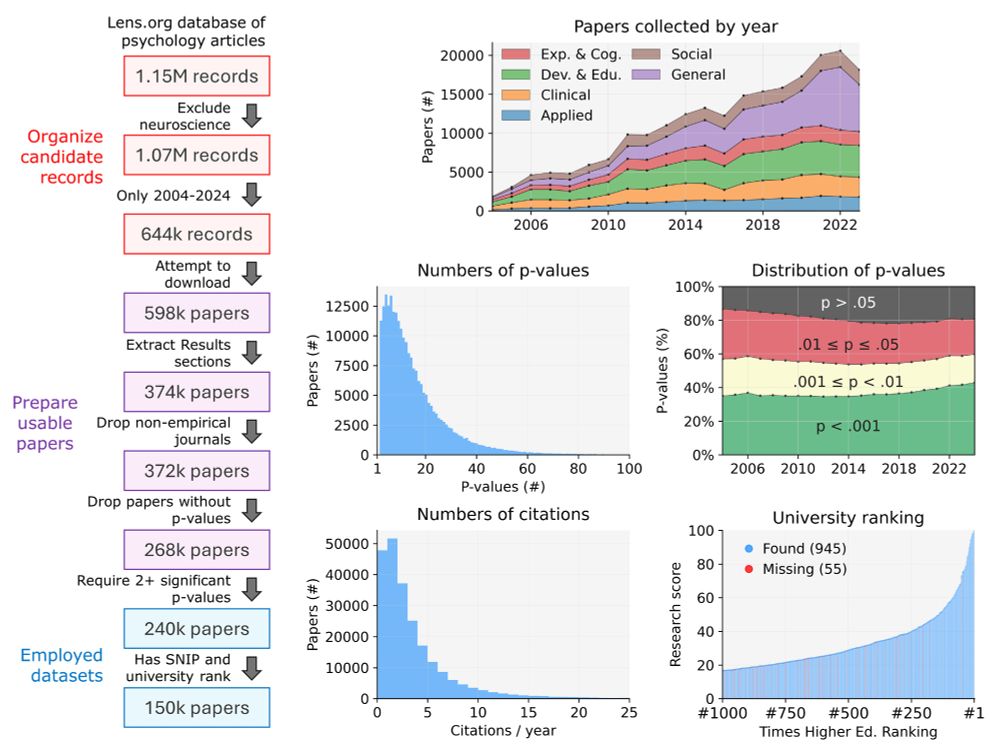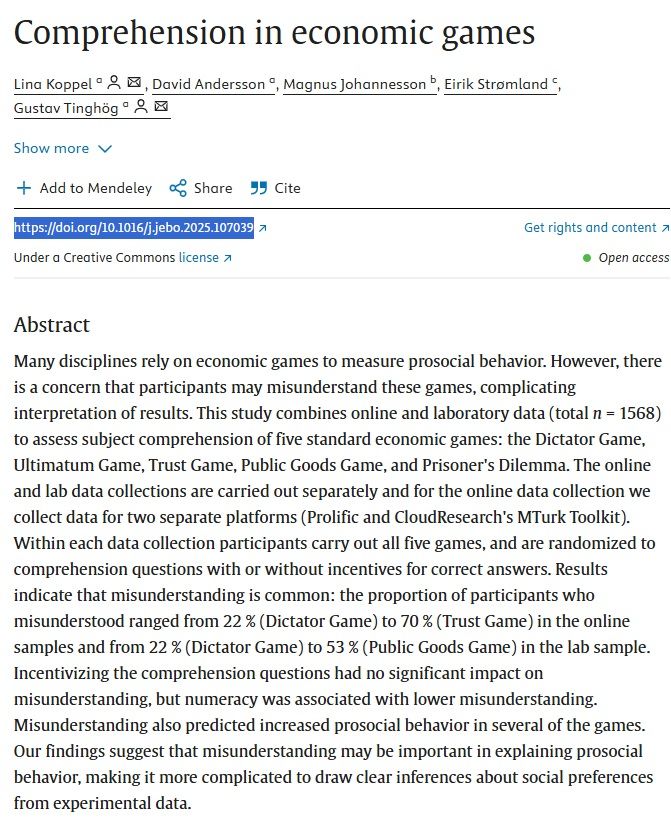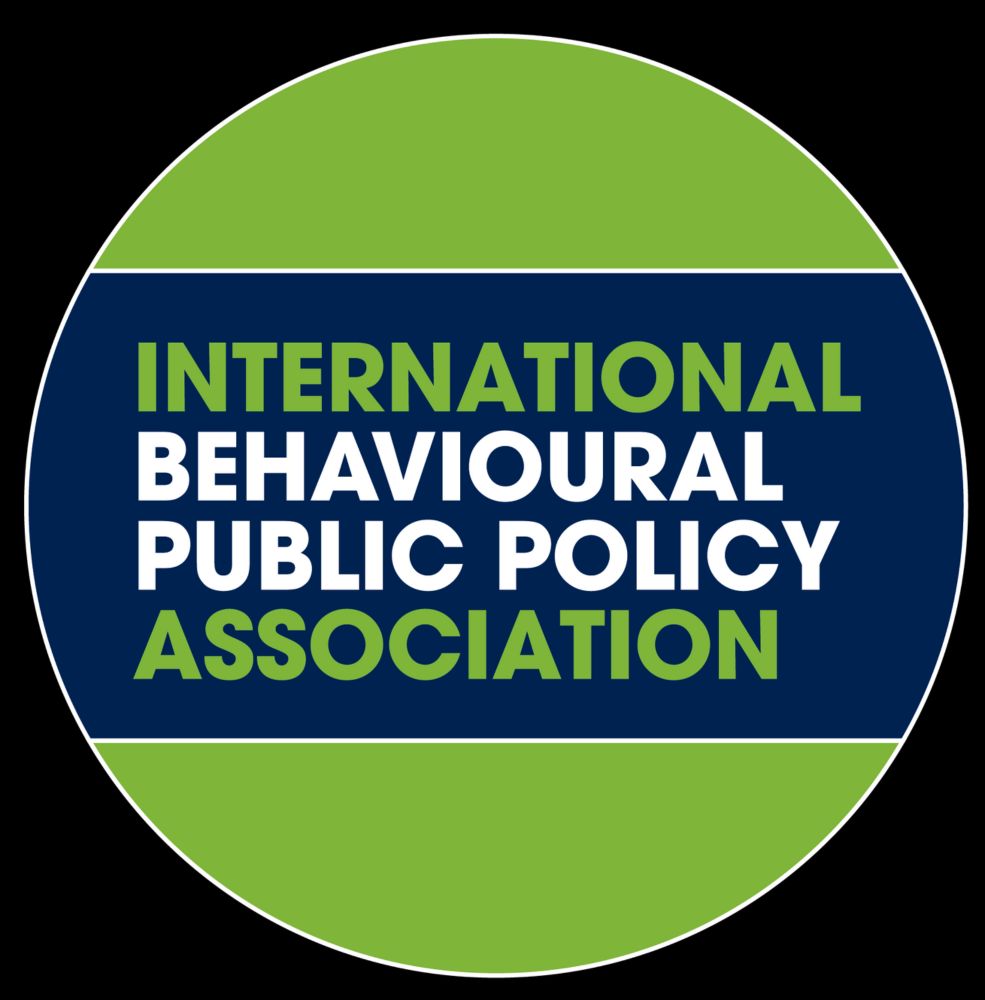Patrik Michaelsen
@michaelsen.bsky.social
Post doc in political science University of Gothenburg.
Behavioral public policy, conservation policy, transparency, behavior change, open science
www.patrikmichaelsen.com
Behavioral public policy, conservation policy, transparency, behavior change, open science
www.patrikmichaelsen.com
Pinned

Mass support for conserving 30% of the Earth by 2030: Experimental evidence from five continents | PNAS
Rapid global expansion of protected areas is critical for safeguarding biodiversity
but depends on political action for successful implementation. ...
www.pnas.org
New: Strong global support for the 30x30 conservation target
*Data from 5 continents (N=12k) show 82% in support of 30x30
*2 experiments find highly consistent expansion policy preferences, incl. prioritization of nature and rich countries bearing higher costs
Out now OA in @pnas.org. Viz. below.
*Data from 5 continents (N=12k) show 82% in support of 30x30
*2 experiments find highly consistent expansion policy preferences, incl. prioritization of nature and rich countries bearing higher costs
Out now OA in @pnas.org. Viz. below.
Environmental social science post doc position in Gothenburg with highly recommended colleagues
We’re hiring a Postdoc in Environmental Psychology!
Focusing on climate policy support, or resistance, and how social norms shape that acceptance. The project bridges psychology and political science, using experimental, longitudinal, and meta-analytic methods.
📅 Apply by Nov 27, 2025
Focusing on climate policy support, or resistance, and how social norms shape that acceptance. The project bridges psychology and political science, using experimental, longitudinal, and meta-analytic methods.
📅 Apply by Nov 27, 2025
Postdoctoral researcher in psychology, specializing in environmental psychology
The Department of Psychology has around 130 employees and conducts extensive education and research in
web103.reachmee.com
November 10, 2025 at 1:09 PM
Environmental social science post doc position in Gothenburg with highly recommended colleagues
Reposted by Patrik Michaelsen
Achieving the global 30by30 #biodiversity conservation targets requires political compromises & navigating conflicts. @michaelsen.bsky.social et al. found strong public support for the targets in 8 countries, which suggests expansion of protected areas is politically feasible doi.org/10.1073/pnas...

September 5, 2025 at 12:03 PM
Achieving the global 30by30 #biodiversity conservation targets requires political compromises & navigating conflicts. @michaelsen.bsky.social et al. found strong public support for the targets in 8 countries, which suggests expansion of protected areas is politically feasible doi.org/10.1073/pnas...
New: Strong global support for the 30x30 conservation target
*Data from 5 continents (N=12k) show 82% in support of 30x30
*2 experiments find highly consistent expansion policy preferences, incl. prioritization of nature and rich countries bearing higher costs
Out now OA in @pnas.org. Viz. below.
*Data from 5 continents (N=12k) show 82% in support of 30x30
*2 experiments find highly consistent expansion policy preferences, incl. prioritization of nature and rich countries bearing higher costs
Out now OA in @pnas.org. Viz. below.

Mass support for conserving 30% of the Earth by 2030: Experimental evidence from five continents | PNAS
Rapid global expansion of protected areas is critical for safeguarding biodiversity
but depends on political action for successful implementation. ...
www.pnas.org
September 1, 2025 at 10:05 AM
New: Strong global support for the 30x30 conservation target
*Data from 5 continents (N=12k) show 82% in support of 30x30
*2 experiments find highly consistent expansion policy preferences, incl. prioritization of nature and rich countries bearing higher costs
Out now OA in @pnas.org. Viz. below.
*Data from 5 continents (N=12k) show 82% in support of 30x30
*2 experiments find highly consistent expansion policy preferences, incl. prioritization of nature and rich countries bearing higher costs
Out now OA in @pnas.org. Viz. below.
Hey! If social psychology could read they’d be very upset
Academia will form these little pockets -- people whose theorizing is outrageous & supported by methods outdated since the 90s -- but once it reaches a critical size those people just review each others papers & grants, form societies, hand out awards etc, like a self-contained parallel society.
June 3, 2025 at 6:09 AM
Hey! If social psychology could read they’d be very upset
Reposted by Patrik Michaelsen
🚨New paper!🚨
Meta-analysis on 4M p-values across 240k psych articles: How has psychology changed since the replication crisis began? How is replicability linked to citations, impact factor, and university prestige? 🧵
Paper: journals.sagepub.com/doi/10.1177/...
Interactive: pbogdan.com/meganal
Meta-analysis on 4M p-values across 240k psych articles: How has psychology changed since the replication crisis began? How is replicability linked to citations, impact factor, and university prestige? 🧵
Paper: journals.sagepub.com/doi/10.1177/...
Interactive: pbogdan.com/meganal

April 9, 2025 at 1:15 PM
🚨New paper!🚨
Meta-analysis on 4M p-values across 240k psych articles: How has psychology changed since the replication crisis began? How is replicability linked to citations, impact factor, and university prestige? 🧵
Paper: journals.sagepub.com/doi/10.1177/...
Interactive: pbogdan.com/meganal
Meta-analysis on 4M p-values across 240k psych articles: How has psychology changed since the replication crisis began? How is replicability linked to citations, impact factor, and university prestige? 🧵
Paper: journals.sagepub.com/doi/10.1177/...
Interactive: pbogdan.com/meganal
Reposted by Patrik Michaelsen
Haven't read this yet, but this seems very important for #ExpEcon folks. 22–27% failed comprehension in the DG & UG; in the Trust Game and Public Goods Game, that number hit 70% and 52%. doi.org/10.1016/j.je... (Note saw posted on other site but author doesn't seem to be here, so making a new post)

May 27, 2025 at 9:56 PM
Haven't read this yet, but this seems very important for #ExpEcon folks. 22–27% failed comprehension in the DG & UG; in the Trust Game and Public Goods Game, that number hit 70% and 52%. doi.org/10.1016/j.je... (Note saw posted on other site but author doesn't seem to be here, so making a new post)
Reposted by Patrik Michaelsen
🚨 New paper out in @pnas.org 🚨
Together with Armin Granulo and Christoph Fuchs, we explore how people respond to system-level policies—like bans or mandates— 𝘣𝘦𝘧𝘰𝘳𝘦 vs. 𝘢𝘧𝘵𝘦𝘳 they are implemented.
Paper 🔗 doi.org/10.1073/pnas...
Preprint 🔗 osf.io/preprints/ps...
Open materials 🔗 osf.io/6qajn/
Together with Armin Granulo and Christoph Fuchs, we explore how people respond to system-level policies—like bans or mandates— 𝘣𝘦𝘧𝘰𝘳𝘦 vs. 𝘢𝘧𝘵𝘦𝘳 they are implemented.
Paper 🔗 doi.org/10.1073/pnas...
Preprint 🔗 osf.io/preprints/ps...
Open materials 🔗 osf.io/6qajn/

May 1, 2025 at 3:19 PM
🚨 New paper out in @pnas.org 🚨
Together with Armin Granulo and Christoph Fuchs, we explore how people respond to system-level policies—like bans or mandates— 𝘣𝘦𝘧𝘰𝘳𝘦 vs. 𝘢𝘧𝘵𝘦𝘳 they are implemented.
Paper 🔗 doi.org/10.1073/pnas...
Preprint 🔗 osf.io/preprints/ps...
Open materials 🔗 osf.io/6qajn/
Together with Armin Granulo and Christoph Fuchs, we explore how people respond to system-level policies—like bans or mandates— 𝘣𝘦𝘧𝘰𝘳𝘦 vs. 𝘢𝘧𝘵𝘦𝘳 they are implemented.
Paper 🔗 doi.org/10.1073/pnas...
Preprint 🔗 osf.io/preprints/ps...
Open materials 🔗 osf.io/6qajn/
Reposted by Patrik Michaelsen
A new blog post by Lauren Yehle, @michaelsen.bsky.social, Niklas Harring, and Sverker C. Jagers - t.ly/cw_CR !
The article “Conservation for nature and wildlife’s sake: the effects of (non-)anthropocentric ethical justifications on policy acceptability” is available here: t.ly/HWHfQ
The article “Conservation for nature and wildlife’s sake: the effects of (non-)anthropocentric ethical justifications on policy acceptability” is available here: t.ly/HWHfQ

Conservation for Nature and Wildlife’s Sake: The Effects of (Non-)Anthropocentric Ethical Justifications on Policy Acceptability « Political Science and International Relations# « Cambridge Core Blog
Human activities continue to degrade nature and encroach on wildlife’s habitats and undeveloped open areas. Concern for the environment appears to be increasing as indicated by numerous countries sign...
t.ly
March 23, 2025 at 11:19 PM
A new blog post by Lauren Yehle, @michaelsen.bsky.social, Niklas Harring, and Sverker C. Jagers - t.ly/cw_CR !
The article “Conservation for nature and wildlife’s sake: the effects of (non-)anthropocentric ethical justifications on policy acceptability” is available here: t.ly/HWHfQ
The article “Conservation for nature and wildlife’s sake: the effects of (non-)anthropocentric ethical justifications on policy acceptability” is available here: t.ly/HWHfQ
Reposted by Patrik Michaelsen
I knew publication bias in political science was bad; I didn't know it was this bad.
"98.8% of abstracts report non-null results compared to only 16.9% reporting null findings."
This is bad.
"98.8% of abstracts report non-null results compared to only 16.9% reporting null findings."
This is bad.
New WP with @vincentab.bsky.social @ryancbriggs.net. We use LLMs and RAs to track publication trends in polisci. Here’s how subfields have changed in AJPS and JOP osf.io/v7fe8

February 10, 2025 at 6:57 PM
I knew publication bias in political science was bad; I didn't know it was this bad.
"98.8% of abstracts report non-null results compared to only 16.9% reporting null findings."
This is bad.
"98.8% of abstracts report non-null results compared to only 16.9% reporting null findings."
This is bad.
Reposted by Patrik Michaelsen
A new interesting article by Lauren Yehle, @michaelsen.bsky.social, Niklas Harring, and Sverker C. Jagers is now available. It is entitled “Conservation for nature and wildlife’s sake: the effects of (non-)anthropocentric ethical justifications on policy acceptability”.
Enjoy it here: t.ly/HWHfQ
Enjoy it here: t.ly/HWHfQ

January 7, 2025 at 10:13 AM
A new interesting article by Lauren Yehle, @michaelsen.bsky.social, Niklas Harring, and Sverker C. Jagers is now available. It is entitled “Conservation for nature and wildlife’s sake: the effects of (non-)anthropocentric ethical justifications on policy acceptability”.
Enjoy it here: t.ly/HWHfQ
Enjoy it here: t.ly/HWHfQ
Reposted by Patrik Michaelsen
the fallout from the Francesca Gino research misconduct scandal isn't over. @engber.bsky.social writes about how an effort by some of her colleagues to self-audit their work with her ended up raising even more questions — for them personally and their whole field www.theatlantic.com/magazine/arc...

The Business-School Scandal That Just Keeps Getting Bigger
The rot runs deeper than almost anyone has guessed.
www.theatlantic.com
November 19, 2024 at 10:17 PM
the fallout from the Francesca Gino research misconduct scandal isn't over. @engber.bsky.social writes about how an effort by some of her colleagues to self-audit their work with her ended up raising even more questions — for them personally and their whole field www.theatlantic.com/magazine/arc...
Reposted by Patrik Michaelsen
Abstracts deadline for the 4th annual International Behavioural Public Policy Conference is January 31st, 2025. Next year's conference will be in the UK, 10-12 September
Full details on abstract submission: www.ibppa.org/conference-s...
Full details on abstract submission: www.ibppa.org/conference-s...

IBPPC 2025 - Submissions | IBPPA
www.ibppa.org
November 15, 2024 at 2:32 PM
Abstracts deadline for the 4th annual International Behavioural Public Policy Conference is January 31st, 2025. Next year's conference will be in the UK, 10-12 September
Full details on abstract submission: www.ibppa.org/conference-s...
Full details on abstract submission: www.ibppa.org/conference-s...

